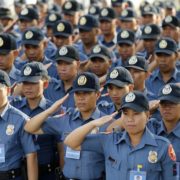The Philippine National Police (PNP) on Thursday, April 12, maintained that the government’s anti-illegal drugs campaign is “constitutional, legal, and is implemented in the interest of public safety.”
In a statement, PNP spokesman Chief Supt. John Bulalacao dismissed anew the allegations that the deaths related to the drug war are state-sanctioned.
“We maintain that the PNP campaign against illegal drugs is constitutional, legal and is implemented in the interest of public safety. All allegations are part of the healthy democracy that the country has,” Bulalacao said.
He noted that the presumption of regularity “remains with the law enforcers and unless proven otherwise in the court of law.”
“Emphasis should not only be focused on the almost 4,000 deaths in police operations but also on the more than 1.3 M surrenderers, 120,000 plus arrested persons and on the number of law enforcers who have died during these police operations,” Bulalacao said.
He further argued that surrenderers and arrested suspects “should not be alive as well” if the allegations of state-sanctioned killings were true.
The Supreme Court (SC) has recently dismissed a petition filed by Solicitor General Jose Calida asking the high court to rescind its order requiring the PNP to submit data on the killings of all drug suspects during the implementation of “Oplan Tokhang” from July 1, 2016 to Nov. 30, 2017.
In his appeal, Calida argued that disclosing these documents “in the long run will have an undeniable effect on national security and could spell the success or failure of follow-up operations of police and other law enforcement bodies, aside from endangering the lives of those on the list as well as those already in custody.”
But the SC, in a resolution released Tuesday, April 10, said that the “requested information and documents do not obviously involve state secrets affecting national security.”
“There is no showing that the country’s territorial integrity, national sovereignty, independence, or foreign relations will be compromised or prejudiced by the release of these information and documents to this Court or even to the public,” it added.
The high court also noted that it asked submission of drug war data for the government to “establish its claim of the legitimacy of police operations.”
The SC pointed out that that Office of the Solicitor General’s (OSG) refusal to the order only lead the high court to the think that the documents are being “willfully suppressed.”
“The OSG’s continued refusal to submit to this Court’s requirement will lead this Court to presume that these information and documents, because they are wilfully suppressed, will be adverse to the OSG’s case,” the resolution read.





